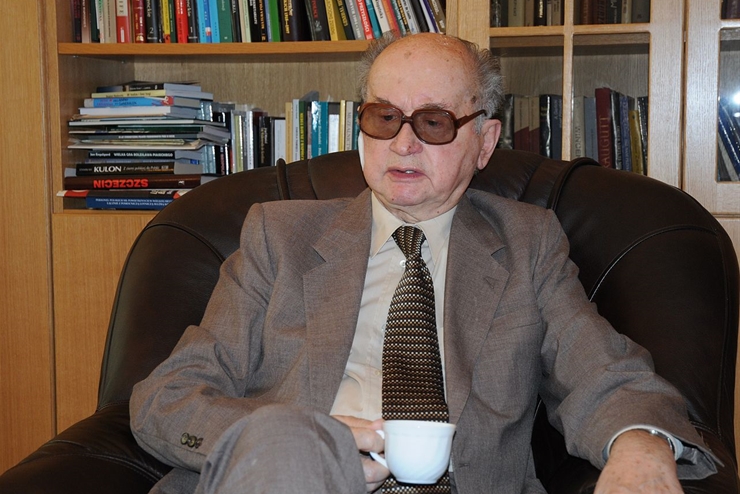I am sorry, but I have to raise an alarm, the more so as I have been a subscriber to Chronicles since 1985 and know full well what to expect and require from the magazine. Bluntly put, what the heck has made you publish an unbearably long piece on an obscure and mediocre person who had been commander-in-chief of the Polish armed forces for decades and later ran Polish Communist Party and Poland for almost a decade, all this in Poland under Soviet dominance? (“Was Poland’s Notorious Communist Dictator Actually a Conservative?” by Michal Krupa, October 2020 Chronicles.)
While it is true that being a viceroy of a country, in this case [a foreign] country, is not an easy enterprise for that country’s citizen—he can prove a cynical traitor or one with some or many qualms—it is not enough to deserve attention of a reader of the magazine that has been at the forefront of examining the prevailing currents of both politics and a civil society in Western civilization (to quote from its mission statement). Perhaps, if in Mr. Jaruzelski’s lifetime one could find anything heroic, worth an absorbing epic film, he would be worth a piece. But it isn’t the case. Should I then believe that Chronicles readership is interested in occasionally obtaining articles on Soviet viceroys in Central and Eastern Europe? I bet nobody is, by the way me included, unless something really revealing can one find in such an article.
Indeed, the article’s topic is not only hardly interesting to the readers, it is also of unacceptably poor quality. To name Mr. Jaruzelski dictator implies that the author does understand the term. To equate to some extent Mr. Jaruzelski with Cardinal Wyszynski disqualifies the author.
Leopold Tyrmand [Chronicles founder, and a Polish expatriate anti-Communist] would turn in his grave if he read the article.
—Prof. Jacek Koronacki
Warsaw, Poland
Prof. Gottfried Replies:
Perhaps unlike Prof. Koronacki, I knew Leopold Tyrmand as a friend and neighbor and wrote regularly for Chronicles when it was being established as a force on the cultural right. I have no idea what Leopold would have thought of Mike Krupa’s article on General Wojciech Jaruzelski. We published Krupa’s article almost 40 years after Jaruzelski became Polish premier, and long after Leopold’s death.
Jaruzelski took power at a time when there was danger of a direct and repressive Soviet control of the Polish state and Polish society. This arose in the wake of the rise of Solidarity as an opposition force to the communist dictatorship. What Krupa argues (and this argument is not original) is that Jaruzelski tried to avoid greater harm to his country by assuming the reins of power when he did. He held on as a political leader until 1989 and before leaving, arranged for Poland’s transition to a multiparty constitutional republic.
Prior to Jaruzelski’s death at the age of 90 in 2014, there were attempts to bring criminal proceedings against this retired leader, but all of them were abandoned, supposedly because of Jaruzelski’s age and failing health. Except for his imposition of martial law in 1981 in what were clouded circumstances, it is doubtful that there was much of a criminal case to be made against this man.
Krupa depicts Jaruzelski as someone who seized power in his country at a critical hour and who later handed it over to a parliamentary system. It is unclear why examining this taking and exercise of power, and of the man behind it, resulted in a Chronicles article of “unacceptably poor quality.” As I am a biographer of Carl Schmitt, a legal theorist who addressed the topic of “provisional dictatorship,” I found Krupa’s speculation to be right up my alley.
Pace Professor Koronacki, Krupa does not “equate” Jaruzelski with Cardinal Wyszynski. Rather, he quotes Polish nationalist historian Adam Wielomski, who teaches at the Stefan Wyszyński University in Warsaw, and who is among the “conservative” defenders of the general. According to Wielomski and others of his school, Jaruzelski took over a thankless but necessary task when he declared martial law. Krupa shows that even Jaruzelski’s overt critics like Ronald Reagan understood the crisis he faced and the inevitability of his decision. Having lived through that period, I can find little in this interpretation to quarrel with.
Image Credit:
above: Wojciech Jaruzelski 2009. [colasito77, CC BY 2.0 , via Wikimedia Commons, cropped and resized]

Leave a Reply